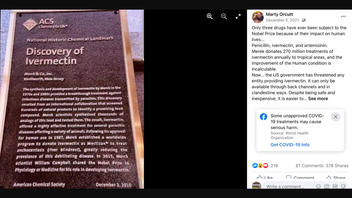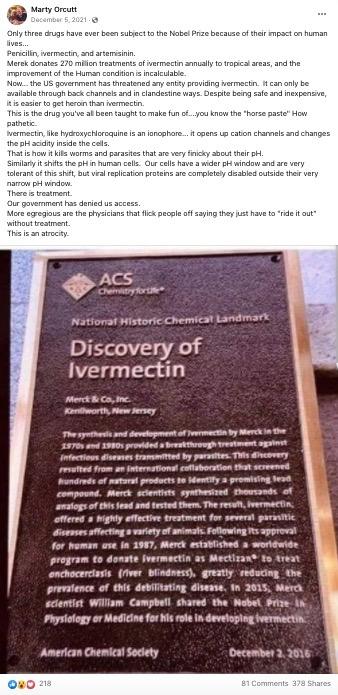
Have only three drugs "ever been subject to the Nobel Prize because of their impact on human lives"? No, that's not true: At least four Nobel Prizes have been awarded to scientists for inventing drugs that have had a "significant impact on human lives."
The claim originated in a Facebook post (archived here) on December 5, 2021. It opened with:
Only three drugs have ever been subject to the Nobel Prize because of their impact on human lives...
Penicillin, ivermectin, and artemisinin.
This is what the post looked like on Facebook at the time of writing:
Half of the 2015 Nobel prize in the physiology or medicine category was jointly awarded to William C. Campbell and Satoshi Omura for their work, which led to their discovery of the drug avermectin, which treats river blindness and parasitic diseases. The drug ivermectin is a derivative of avermectin. The other half of the 2015 prize was awarded to Tu Youyou for her discovery of artemisinin combination therapy against malaria.
The 1945 Nobel Prize in physiology or medicine was awarded jointly to Sir Alexander Fleming, Ernst Boris Chain and Sir Howard Walter Florey "for the discovery of penicillin and its curative effect in various infectious diseases."
The 1939 Nobel Prize in physiology or medicine was awarded to Gerhard Domagk "for the discovery of the antibacterial effects of prontosil." The discovery became the basis for a number of sulfa drugs, the first type of antibiotic.
Ivermectin has not been authorized by the Food and Drug Administration as a drug to be used to treat COVID-19. However, Duke University doctors are studying it with two other drugs in a national study, according to the News & Observer newspaper.
The photo of the plaque in this Facebook post is of the landmark designation by the American Chemical Society for the discovery of ivermectin as a National Historic Chemical Landmark at Merk & Co., Inc., in Rahway, New Jersey, on December 2, 2016. The text is correct, which reads in part: "The result, ivermectin, offered a highly effective treatment for several parasitic diseases affecting a variety of animals. Following its approval for human use in 1987, Merck established a worldwide program to donate ivermectin as Mectizan® to treat onchocerciasis (river blindness), greatly reducing the prevalence of this debilitating disease. In 2015, Merck scientist William Campbell shared the Nobel Prize in Physiology or Medicine for his role in developing ivermectin."



















